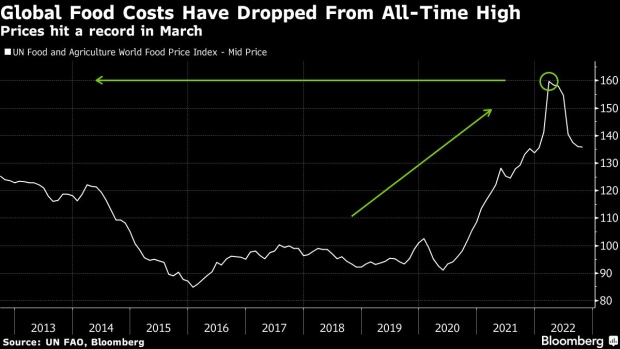Nov 16, 2022
Food Prices Will Likely Be Lower Next Year, Cargill CEO Says
, Bloomberg News

(Bloomberg) -- Food prices will probably decline next year, even as global crop stockpiles stay very tight, especially for oilseeds, said David MacLennan, chief executive officer of Cargill Inc., America’s largest private company.
“All it takes is one really bad crop, let’s say in North America or South America, to really send prices higher,” he said at the Bloomberg New Economy Forum in Singapore on Wednesday.
World food costs jumped to a record in March after the Russian invasion of Ukraine choked off supplies from one of the world’s top exporters. Prices have since declined after a UN-brokered deal to allow ships with Ukrainian grain to pass safely through the Black Sea. Talks are currently taking place to renew that agreement, which expires on Nov. 19.
READ: Russia Poised to Agree on Extending Black Sea Grain Deal
MacLennan said the solution to the food-versus-fuel debate is to boost global crop production. “We don’t think it’s going to be an either/or dynamic,” he said. “It can be food and fuel.” Regenerative agricultural practices, greater yields and more use of technology can increase output so that it can meet demand from both sectors, he said.
Other points from MacLennan:
- Food should not be used as a weapon
- Impact of climate change, geopolitics and supply chain disruptions are profound; they’re hard to predict and difficult to control
- Cargill sees regenerative agriculture as part of solution for sustainable output and impact of climate change
- World depends on an interconnected food system
- Farmers, food workers and western companies have been working hard to feed world
- “We’ve done our job, and we’ve gotten food from where it’s produced, to where it’s needed. We’ve managed the volatility, we managed through supply chain disruptions”
READ: Cargill Smashes Profit Record Amid Unprecedented Volatility
©2022 Bloomberg L.P.





